rotten > Library > Biographies > Presidents > Ronald Reagan
Ronald Wilson Reagan
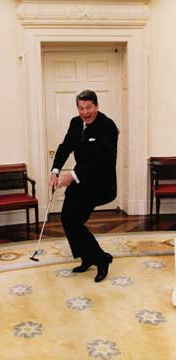 Everybody knew he was a dumbass. Ronald Reagan was famous for not understanding how government works and not particularly caring about it. His job was to read speeches off the Teleprompter, shake hands with foreign dignitaries, pose for pictures, and maybe go out and visit a flag factory or a steel mill every once in a while. Otherwise he was busy sleeping in, eating jellybeans, and watching television.
Everybody knew he was a dumbass. Ronald Reagan was famous for not understanding how government works and not particularly caring about it. His job was to read speeches off the Teleprompter, shake hands with foreign dignitaries, pose for pictures, and maybe go out and visit a flag factory or a steel mill every once in a while. Otherwise he was busy sleeping in, eating jellybeans, and watching television.
Even so, Reagan got deferential treatment from the press, so the news coverage almost always cast him in the best possible light. He was extremely comfortable in front of the cameras, as you would expect—after all, he had been a movie star prior to becoming a politician. And he could be disarmingly affable. He often shared jokes and anecdotes and brilliantly-scripted one-liners that sounded spontaneous. But none of that explains why the journalists decided to take it easy on him.
The reason Reagan got a free ride in the media stemmed from his fortuitously-timed assassination attempt.
The man had been President of the United States for just 69 days when he was shot by a lunatic trying to impress movie actress Jodie Foster. On March 30, 1981 one of John Hinckley's bullets ricocheted off the Presidential limousine and penetrated Reagan's chest just below the armpit. An agent of the Secret Service shoved him into the vehicle and it sped away from the scene. At first glance, the President appeared to be unhurt. He even turned to the agent and complained, "You sonofabitch, you broke my rib." Then they noticed the blood.
He was rushed to George Washington Hospital, where he underwent three hours of emergency surgery. Before they put him under anesthesia, Reagan told the trauma team, "Please tell me you're all Republicans." The head of the team, Dr. Joseph Giordano, was in fact a liberal Democrat. Nevertheless, he reassured the President by telling him, "We're all Republicans today." They extracted a .22 caliber slug from the President's wrinkly, 70-year-old left lung. Next, the doctors filled the damaged areas with patching compound, waited for it to dry, then sanded, primed, and slapped on two coats of high-gloss paint, tinted to match the coloration of healthy tissue. In no time at all, Reagan was on the mend.
Following Dr. Giordano's lead, the American people immediately rallied around their wounded leader. Reagan's popularity ratings suddenly went through the roof, inflated by public sympathy. The nation's news editors and publishers chose to play along, rather than risk appearing cold and heartless. This deference persisted throughout his Presidency. So when Reagan would say something phenomenally stupid during a press conference, most news outlets just let it go. Even when he was obviously lying his ass off, he never really got called on it. Reagan received the nickname "The Teflon President" thanks to this phenomenon, the name being that of a nonstick coating applied to cookware.
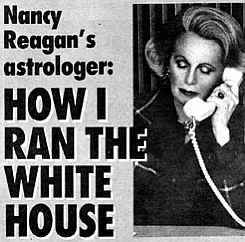 After the shooting, First Lady Nancy heard from her part-time astrologer, Joan Quigley, that they could have and would have predicted that March 30 was destined to be a bad day for her husband... if only Quigley had been on the payroll. Rather than risk a similar incident happening, Nancy decided that it would be prudent to keep the astrologer in the loop. She ordered dedicated phone lines be installed at the White House and Camp David, just so she would never be without the wisdom of the Zodiac.
After the shooting, First Lady Nancy heard from her part-time astrologer, Joan Quigley, that they could have and would have predicted that March 30 was destined to be a bad day for her husband... if only Quigley had been on the payroll. Rather than risk a similar incident happening, Nancy decided that it would be prudent to keep the astrologer in the loop. She ordered dedicated phone lines be installed at the White House and Camp David, just so she would never be without the wisdom of the Zodiac.
For the next eight years, Quigley determined the most opportune timing for all of the President's crucial activities. The First Lady would furnish Ronnie's tentative itinerary, which the astrologer would optimize and return. Then the White House staff would make the necessary adjustments. This tinkering affected the scheduling of press conferences, Air Force One departures, even the timing of international summits.
As former White House Chief of Staff Don Regan later wrote in his memoirs:
Although I had never met this seer—Mrs. Reagan passed along her prognostications to me after conferring with her on the telephone—she had become such a factor in my work, and in the highest affairs of the nation, that at one point I kept a color-coded calendar on my desk (numerals highlighted in green ink for "good" days, red for "bad" days, yellow for "iffy" days) as an aid to remembering when it was propitious to move the president of the United States from one place to another, or schedule him to speak in public, or commence negotiations with a foreign power.
Following the astrologer's instructions, the selection of Anthony Kennedy for the Supreme Court was announced to the press at precisely 11:32:25 A.M. According to Quigley's memoir, the President was cued by "a man with a stopwatch" to make sure he hit the exact moment. (She does not mention whether she gave similar assistance to the President's two previous selections to fill that seat, archconservative Robert Bork and former pot smoker Douglas Ginsburg, who both failed to gain Senate confirmation.)
Ronnie was himself a superstitious man. He always carried a lucky charm in his pocket. He knocked on wood, avoided walking under ladders, and made a habit of tossing salt over his left shoulder before each meal. So it shouldn't be surprising that the astrology stuff would appeal to him. Throughout the 1950s, Ron and Nancy sought out the services of Carroll Righter, astrologer to the stars. When Reagan won California's governor seat, he scheduled his inauguration for 12:10 A.M., on Righter's insistence. And in the 1960s, Ron had been consulting with psychic Jeane Dixon over whether to run for President someday.
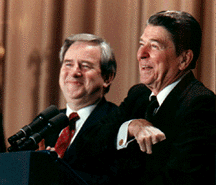 Somehow, none of this ever seemed to bother the Christian right. Bear in mind that, to a fundamentalist Christian, astrology is practically witchcraft. It's divination, which is specifically prohibited by the Bible. So it's a little surprising that people like Jerry Falwell would be so happy to show his support. But despite Reagan's persistent and ongoing reliance upon the dark arts, they knew that he was their guy.
Somehow, none of this ever seemed to bother the Christian right. Bear in mind that, to a fundamentalist Christian, astrology is practically witchcraft. It's divination, which is specifically prohibited by the Bible. So it's a little surprising that people like Jerry Falwell would be so happy to show his support. But despite Reagan's persistent and ongoing reliance upon the dark arts, they knew that he was their guy.
First and foremost, Reagan was a firm adherent to Biblical prophecy; specifically, he believed that the end of the world—the Battle of Armageddon—was close at hand. As you know, the fundamentalists just love that eschatalogical stuff.
While he was running for office in 1980, candidate Reagan announced during an interview with televangelist Jim Bakker that "We may be the generation that sees Armageddon." But that certainly wasn't the first time. At a 1971 banquet for California state senator James Mills, then-Governor Reagan broke it all down for the honoree during the dessert course:
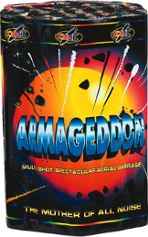
|
"In the 38th chapter of Ezekiel, it says that the land of Israel will come under attack by the armies of the ungodly nations, and it says that Libya will be among them. Do you understand the significance of that? Libya has now gone Communist, and that's a sign that the day of Armageddon isn't far off.
"Biblical scholars have been saying for generations that Gog must be Russia. What other powerful nation is to the north of Israel? None. But it didn't seem to make sense before the Russian revolution, when Russia was a Christian country. Now it does, now that Russia has become communistic and atheistic, now that Russia has set itself against God. Now it fits the description of Gog perfectly.
"For the first time ever, everything is in place for the battle of Armageddon and the Second Coming of Christ. It can't be too long now. Ezekiel says that fire and brimstone will be rained upon the enemies of God's people. That must mean that they will be destroyed by nuclear weapons."
|
In an interview published in a December 1983 issue of People magazine, the most powerful man in the world revealed that:
"[T]heologians had been studying the ancient prophecies—what would portend the coming of Armageddon-- and have said that never, in the time between the prophecies up untiI now, has there ever been a time in which so many of the prophecies are coming together. There have been times in the past when people thought the end of the world was coming, and so forth, but never anything like this."
During an October 1984 Presidential debate, the Commander-In-Chief was asked to clarify his position on the matter. Which he kind of dodged:
| REPORTER: |
Mr. President, I'd like to pick up this Armageddon theme. You've been quoted as saying that you do believe deep down that we are heading for some kind of Biblical Armageddon. Your Pentagon and your Secretary of Defense have plans for the United States to fight and prevail in a nuclear war. Do you feel that we are now heading, perhaps, for some kind of nuclear Armageddon? And do you feel that this country and the world could survive that kind of calamity? |
| PRESIDENT REAGAN: |
Mr. Kalb, I think what has been hailed as something I'm, supposedly, as President, discussing as principle is the result of just some philosophical discussions with people who are interested in the same things. And that is the prophecies down through the years, the Biblical prophecies of what would portend the coming of Armageddon and so forth. And the fact that a number of theologians for the last decade or more have believed that this was true, that the prophecies are coming together that portend that. But no one knows whether Armageddon—those prophecies—mean that Armageddon is a thousand years away or day after tomorrow. So I have never seriously warned and said we must plan according to Armageddon. |
But President Reagan did more than just talk the Talk. He was also an ardent supporter of school prayer and anti-abortion laws. He withheld funding from international contraception programs. Over complaints by the ACLU, he officially declared 1983 to be "The Year of the Bible." And he appointed likeminded Jesus freaks to his cabinet. During a 1981 Congressional hearing, Reagan's first Secretary of the Interior, James Watt, revealed the depth of his commitment to preserving America's environment for posterity:
"I do not know how many future generations we can count on before the Lord returns."
As a member of the cabinet, Watt represented the best and brightest that America had to offer. Reagan gave him and the other underlings wide latitude to make and implement policy. Fortune magazine ran an interview with the President in September 1986 wherein he described his theory of management:
"Surround yourself with the best people you can find, delegate authority, and don't interfere."
A few months later, the full implications of this hands-off managerial philosophy would be made clear when the Iran-Contra scandal broke.
Iran-Contra
Apparently, Reagan's National Security Council decided to launch an independent covert operation lacking any oversight from Congress, the courts, or even the President himself. It would be self-funding and, consequently, completely above the law. The operation was known internally as "The Enterprise" although it should have been called "The Private Enterprise" since its primary goal was to turn a profit.
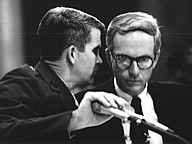 As part of a secret deal to purchase the release of American hostages held in the Middle East, the White House agreed to sell arms to the government of Iran. But that was really just the catalyst for their real objective. The NSC sold Iran weapons, and then funneled some of the proceeds to the Contra insurgency in Nicaragua. This was a blatant and intentional violation of federal law.
As part of a secret deal to purchase the release of American hostages held in the Middle East, the White House agreed to sell arms to the government of Iran. But that was really just the catalyst for their real objective. The NSC sold Iran weapons, and then funneled some of the proceeds to the Contra insurgency in Nicaragua. This was a blatant and intentional violation of federal law.
It was also ripe for embezzlement. Nobody was doublechecking the books. How could they? The operation was more than secret; except for maybe a dozen people in the White House basement, it was absolutely nonexistent. No oversight whatsoever. So no wonder NSC buttboy Oliver North wound up with $200,000 in a Swiss bank account.
While all this was going on, Reagan pretended that there was nothing illegal going on. At one press conference, a journalist addressed the issue point-blank:
| REPORTER: |
Mr. President, why don't we openly support those 7,000 guerrillas that are in rebellion rather than giving aid through covert activity? |
| PRESIDENT REAGAN: |
Well, because we want to keep on obeying the laws of our country, which we are now obeying. |
| REPORTER: |
Doesn't the United States want that government replaced? |
| PRESIDENT REAGAN: |
No, because that would be a violation of the law. |
After the story broke, the President continued to deny everything. When he was finally forced to discuss the growing scandal in November 1986, Reagan declared:
"In spite of the wildly speculative and false stories of arms for hostages and alleged ransom payments, we did not—repeat did not—trade weapons or anything else for hostages; nor will we."
The following month, the White House was impatient about receiving a report on the arms-for-hostages deal by the Senate Intelligence Committee. Senator Leahy commented on the administration's insistent requests for the report:
"The President ordered this whole operation on Iran. He ordered his Administration not to tell the intelligence committees what he was doing. Now he wants the Intelligence Committee to tell him what his Administration was doing during the time they were under his orders not to tell the Intelligence Committee. Even Alice in Wonderland doesn't get this twisted around."
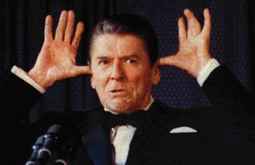 In his January 1987 testimony before the Tower Commission, President Reagan specifically acknowledged having approved the Iranian arms sales back in August 1985. Two weeks later he reversed himself, claiming that his prior statement was erroneous. Reading from his notes, Reagan fucked up when he read some of his stage directions aloud:
In his January 1987 testimony before the Tower Commission, President Reagan specifically acknowledged having approved the Iranian arms sales back in August 1985. Two weeks later he reversed himself, claiming that his prior statement was erroneous. Reading from his notes, Reagan fucked up when he read some of his stage directions aloud:
"If the question comes up at the Tower Board meeting, you might want to say that you were surprised."
D'oh.
A couple of weeks later, Reagan sent a memo to the commission to clarify his testimony yet again. It stated that he had been mistaken during his January deposition, wherein he claimed to have approved the Iranian arms shipments:
The only honest answer is to state that try as I might, I cannot recall anything whatsoever about whether I approved an Israeli sale in advance or whether I approved replenishment of Israeli stocks around August of 1985. My answer therefore and the simple truth is, "I don't remember, period."
But all doubt seemed to have disappeared from his mind in March. Following the revelations of the Tower Commission investigation, Reagan told the American people that he had never approved any such thing.
"A few months ago I told the American people I did not trade arms for hostages. My heart and my best intentions still tell me that's true, but the facts and the evidence tell me it is not."
Reagan also addressed the subject of his much-ballyhooed delegating technique (MBA students, take note):
"Much has been said about my management style, a style that's worked successfully for me during 8 years as Governor of California and for most of my Presidency. The way I work is to identify the problem, find the right individuals to do the job, and then let them go to it. I've found this invariably brings out the best in people. They seem to rise to their full capability, and in the long run you get more done. [...] When it came to managing the NSC staff, let's face it, my style didn't match its previous track record."
In another triumph of keeping the government small and nimble, the NSC evidently did not keep records of its meeting minutes. Reagan explained that this was a woeful oversight, and not a deliberate attempt to cover the tracks of an illegal operation:
"One thing still upsetting me, however, is that no one kept proper records of meetings or decisions. [...] Well, rest assured, there's plenty of recordkeeping now going on at 1600 Pennsylvania Avenue."
Perhaps so, but that didn't mean those documents were being produced for lawful inquiries. Vice President George HW Bush began dictating a daily journal in 1986, which included many references to NSC operations. When Bush's documents were subpoenaed by Congress, he failed to mention the diary despite the fact that diaries were specifically included under the court order. And no wonder. When portions of it were finally produced, one entry from July 1987 seemed to explain Bush's reticence to comply with the mandate:
Howard Baker in the presence of the President, told me today that George Shultz had kept 700 pages of personal notes, dictated to his staff [...] Notes on personal meetings he had with the President. I found this almost inconceivable. Not only that he kept the notes, but that he'd turned them all over to Congress [...] I would never do it. I would never surrender such documents and I wouldn't keep such detailed notes.
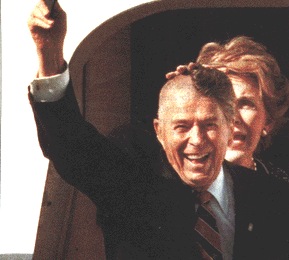 George HW Bush personally attended many of the NSC meetings, and the President himself attended a few as well. But the apparent lack of documentation allowed Bush and Reagan to claim that neither man had been "in the loop" regarding the Boland amendment violations. It's funny how things like that always seem to work out.
George HW Bush personally attended many of the NSC meetings, and the President himself attended a few as well. But the apparent lack of documentation allowed Bush and Reagan to claim that neither man had been "in the loop" regarding the Boland amendment violations. It's funny how things like that always seem to work out.
When Reagan's VP became President, he pardoned six participants in the Iran-Contra scandal who were facing trial. Bush claimed that the prosecutions amounted to nothing more than the "criminalization of policy differences." 15 years later, his son George W Bush ordered the National Archives to withhold 68,000 pages of Reagan administration documents, including papers belonging to his father, who was then the VP. Nobody knows whether this paperwork includes anything germane to the Iran-Contra scandal. Perhaps we will never know.
As for himself, in all likelihood Ronald Reagan genuinely no longer remembers whether he approved the sale of arms to a terrorist nation, in order to illegally fund guerrilla forces in Nicaragua. He probably doesn't remember that he was ever Governor of California, or even President of the United States for that matter. In November 1994, Reagan announced to the world that he was suffering from Alzheimer's disease—an incurable, progressive deterioration of mental faculties.
In August 2002, it was reported that Reagan no longer recognizes his own wife Nancy. According to an unnamed friend: "Some days he seems to recognize her as someone who's familiar, but most of the time she's just a blank to him."
Ronald Reagan's Presidential Pardons
| Albert Alkek |
Clemency for withholding information from federal officials regarding an oil price-fixing scheme. |
| Gilbert Dozier |
Commuted sentence for extortion and racketeering. |
| W. Mark Felt |
Clemency for authorizing FBI agents to break into Vietnam protestors' offices without warrants. |
| Junior Johnson |
Pardoned for liquor offences committed in the 1950s. |
| Edward Miller |
Clemency for authorizing FBI agents to break into Vietnam protestors' offices without warrants. |
| George Steinbrenner |
Clemency for making illegal contributions to Richard M. Nixon's 1972 re-election campaign. |
Timeline
| 6 Feb 1911 |
Ronald Reagan born, Tampico IL. |
| 1932 |
Graduates Eureka College. |
| 25 Jun 1940 |
Marries actress Jane Wyman two months after knocking her up. |
| 4 Jan 1941 |
Daughter Maureen Reagan born. |
| 18 Mar 1945 |
Son Michael Reagan born. |
| 9 Dec 1945 |
Ronald Reagan receives an honorable discharge from the U.S. Army. He had spent World War II in Hollywood, acting in military training films. |
| 1948 |
Divorces Jane Wyman. |
| 4 Mar 1952 |
Marries actress Nancy Davis. |
| 17 Jul 1955 |
Ronald Reagan cohosts live coast-to-coast television coverage of the opening day at Disneyland. |
| 20 May 1958 |
Son Ronald Jr. (Ronald Prescott) born. |
| 10 Oct 1965 |
California gubernatorial candidate Ronald Reagan is quoted in the Fresno Bee as saying: "We should declare war on North Vietnam... It's silly talking about how many years we will have to spend in the jungles of Vietnam when we could pave the whole country and put parking strips on it, and be home by Christmas." |
| 20 Oct 1965 |
California gubernatorial candidate Ronald Reagan is quoted in the Los Angeles Times as saying: "I favor the Civil Rights Act of 1964 and it must be enforced at the point of a bayonet, if necessary." |
| 17 Jun 1966 |
California gubernatorial candidate Ronald Reagan is quoted in the Los Angeles Times as saying: "I would have voted against the Civil Rights Act of 1964." |
| Nov 1966 |
Elected Governor of California, the first actor to hold that position. |
| 16 Oct 1967 |
Ronald Reagan is quoted in the Los Angeles Times as saying: "I have a feeling that we are doing better in the (Vietnam) war than the people have been told." |
| 15 May 1969 |
Regarding the ongoing student protests at UC Berkeley, California governor Ronald Reagan is quoted in the San Francisco Chronicle as saying: "If there has to be a bloodbath, then let's get it over with." |
| 3 Oct 1972 |
"I am very proud to be called a pig. It stands for pride, integrity, and guts." Speech in Oroville, CA. |
| 17 May 1976 |
Ronald Reagan tells Time magazine: "Fascism was really the basis for the New Deal. It was Mussolini's success in Italy, with his government-directed economy, that led the early New Dealers to say 'But Mussolini keeps the trains running on time.'" |
| 1979 |
Ronald Reagan: "The American Petroleum Institute filed suit against the EPA [and] charged that the agency was suppressing a scientific study for fear it might be misinterpreted... The suppressed study reveals that 80 percent of air pollution comes not from chimneys and auto exhaust pipes, but from plants and trees." |
| 1980 |
During an interview with televangelist Jim Bakker on the PTL network, presidential candidate Ronald Reagan predicts that "We may be the generation that sees Armageddon." |
| 15 Feb 1980 |
Presidential candidate Ronald Reagan is quoted in the Burlington Free Press as saying: "All the waste in a year from a nuclear power plant can be stored under a desk." The claim is provably false. |
| 14 Apr 1980 |
Presidential candidate Ronald Reagan is quoted in Time magazine as saying: "History shows that when the taxes of a nation approach about 20 percent of the people's income, there begins to be a lack of respect for government... When it reaches 25 percent, there comes an increase in lawlessness." The claim is provably false. |
| 21 Apr 1980 |
Presidential candidate Ronald Reagan is quoted in Newsweek magazine as saying: "Because Vietnam was not a declared war, the veterans are not even eligible for the G.I. Bill of Rights with respect to education or anything." The claim is provably false. |
| 10 May 1980 |
Presidential candidate Ronald Reagan is quoted in the Chicago Tribune as saying: "Trains are not any more energy efficient than the average automobile, with both getting about 48 passenger miles to the gallon." The claim is provably false. |
| 10 Sep 1980 |
Presidential candidate Ronald Reagan is quoted in Sierra magazine as saying: "Approximately 80% of our air pollution stems from hydrocarbons released by vegetation. So let's not go overboard in setting and enforcing tough emissions standards from man-made sources." The claim is provably false. |
| 9 Oct 1980 |
Ronald Reagan is quoted in the Los Angeles Times as saying: "Growing and decaying vegetation in this land are responsible for 93% of the oxides of nitrogen." The claim is provably false. |
| 20 Oct 1980 |
Presidential candidate Ronald Reagan is quoted in Time magazine as saying: "I have flown twice over Mount St. Helens. I'm not a scientist and I don't know the figures, but I have a suspicion that one little mountain out there, in these last several months, has probably released more sulfur dioxide into the atmosphere than has been released in the last ten years of automobile driving or things of that kind." The claim is provably false. |
| 24 Oct 1980 |
During a nationally-televised campaign speech, Presidential candidate Ronald Reagan declares: "Mr. Carter is acting as if he hasn't been in charge for the past three and a half years; as if someone else was responsible for the largest deficit in American history." (Carter's total deficit: $252 billion; Reagan's: $1.4 trillion) |
| 4 Nov 1980 |
Elected 40th President. |
| 6 Mar 1981 |
Ronald Reagan's second press conference held, in which names of reporters are drawn out of a jellybean jar. Those not chosen (including Associated Press and two of the Big Three TV networks) mostly boycott the conference in disgust. |
| 4 Feb 1981 |
Ronald Reagan: "I want you to know that it is not true that the Moral Majority has been trying to exert undue influence. That rumor started recently when Jerry Falwell called me with a suggestion for Ambassador to Iran: the publisher of Penthouse." |
| 30 Mar 1981 |
President Ronald Reagan shot by John W. Hinckley, Jr. Alexander Haig asserts that he is "in control here", forgetting momentarily about the Consititutional line of succession. The Academy Awards show is postponed one night out of respect for the former thespian and president of the Screen Actors Guild. |
| 27 May 1981 |
John W. Hinckley attempts suicide with a Tylenol overdose, fails. |
| 19 Oct 1981 |
Senator John Schmitz from California reveals during a television interview that, if President Reagan's policies fail, "the best we could probably hope for is a military coup, or something like that." He refines his statement somewhat by explaining that he's referring to "a good military coup, not a bad military coup." |
| 23 Nov 1981 |
After President Reagan vetoes an emergency spending bill which would have prevented a shutdown of the federal government, House Speaker Tip O'Neill tells a reporter: "He knows less about the budget than any president in my lifetime. He can't even carry on a conversation about the budget. It's an absolute and utter disgrace." |
| May 1982 |
President Ronald Reagan declares: "In England, if a criminal carried a gun, even though he didn't use it, he was tried for first-degree murder and hung if he was found guilty." |
| 18 May 1982 |
Ronald Reagan has a small benign polyp removed from his colon. |
| 7 Jun 1982 |
President Ronald Reagan falls asleep during a meeting with Pope John Paul II. |
| 1983 |
President Ronald Reagan honors former CIA Director Richard Helms with the National Security Medal. Regarding his 1977 felony conviction for lying to Congress, Helms remarks: "I have no feelings about remorse or exoneration." |
| 7 Mar 1983 |
President Ronald Reagan tells a group of ultraconservatives that "this country is compelled by scripture and the Lord Jesus Christ to oppose Russia with all military and political means." |
| 21 Sep 1983 |
Ronald Reagan's Secretary of the Interior, James Watt, describes his staff's racial diversity to the U.S. Chamber of Commerce: "We have every mixture you can have. I have a black, a woman, two Jews and a cripple. And we have talent." Watt is forced to resign 18 days later over these comments. |
| 31 Jan 1984 |
President Ronald Reagan tells Good Morning America: "What we have found in this country, and maybe we're more aware of it now, is one problem that we've had, even in the best of times, and that is the people who are sleeping on the grates, the homeless who are homeless, you might say, by choice." |
| 6 Mar 1984 |
Former President Jimmy Carter observes: "President Reagan doesn't always check the facts before he makes statements, and the press accepts this as kind of amusing." |
| 30 Apr 1984 |
When a student at Shanghai's University of Fudan asks which life experiences best prepared him for being President of the United States, Ronald Reagan replies: "You'd be surprised how much being a good actor pays off." |
| 24 Jul 1984 |
Ronald Reagan's doctor reveals that the President has a small polyp in his large intestine. |
| 11 Aug 1984 |
Not realizing that his weekly radio address is already on the air, President Ronald Reagan quips into his live microphone: "My fellow Americans, I'm pleased to tell you today that I've signed legislation that will outlaw Russia forever. We begin bombing in five minutes." |
| 15 Oct 1984 |
During a campaign stop at a McDonald's restaurant in Tuscaloosa, Alabama, President Ronald Reagan asks an aide "What am I supposed to order?" |
| 6 Mar 1985 |
During a White House briefing on the MX missile, President Ronald Reagan opines: "Nuclear war would be the greatest tragedy, I think, ever experienced by mankind, in the history of mankind." |
| 8 Mar 1985 |
Another benign polyp is discovered in Ronald Reagan's colon. |
| 18 Apr 1985 |
"I think that there's nothing wrong with visiting that cemetery [Bitburg], where those young men are victims of Nazism also, even though they were fighting in the German uniform, drafted into service to carry out the hateful wishes of the Nazis. They were victims, just as surely as the victims in the concentration camps." |
| 19 Apr 1985 |
"I know all the bad things that happened in that war. I was in uniform four years myself." |
| 5 May 1985 |
After giving a speech at the Bergen-Belsen death camp, President Ronald Reagan accompanies German Chancellor Helmut Kohl to the Kolmeshöhe military cemetery in Bitburg, Germany. There Reagan lays a wreath in memory of the German war dead. In addition to roughly 2,000 German soldiers of both World Wars, 49 members of the Waffen SS are also buried there. |
| 23 May 1985 |
President Ronald Reagan personally honors an unlikely duo with the Presidential Medal of Freedom: Mother Teresa and Frank Sinatra. |
| 18 Jun 1985 |
President Ronald Reagan: "Americans will never make concessions to terrorists—to do so would only invite more terrorism—once we head down that path there would be no end to it, no end to the suffering of innocent people, no end to the bloody ransom all civilized people must pay." |
| 12 Jul 1985 |
Ronald Reagan undergoes surgery to have a benign polyp removed from his colon. During that procedure, surgeons discover another one, which is also removed. It later turns out to have been cancerous. |
| 4 Dec 1985 |
Anticipating arms control discussions with his Soviet counterpart, President Reagan draws on an extraterrestrial analogy: "[H]ow easy his task and mine might be in these meetings that we held if suddenly there was a threat to this world from some other species from another planet outside in the universe. We'd forget all the little local differences that we have between our countries ..." |
| 17 Jan 1986 |
Three polyps are discovered in Ronald Reagan's colon. |
| 21 Mar 1986 |
In an interview with the New York Times, President Ronald Reagan repeats his long-debunked claim: "In England, if a criminal carried a gun, even though he didn't use it, he was tried for first-degree murder and hung if he was found guilty." |
| 20 Jun 1986 |
Surgeons remove two polyps from Ronald Reagan's large intestine. |
| 4 Jan 1987 |
Ronald Reagan is admitted to the hospital for prostate surgery and the removal of four polyps in his colon. |
| 17 Feb 1987 |
Soviet premier Mikhail Gorbachev reveals Reagan's preoccupation with space aliens: "At our meeting in Geneva, the U.S. President said that if the earth faced an invasion by extraterrestials, the United States and the Soviet Union would join forces to repel such an invasion. I shall not dispute the hypothesis, though I think it's early yet to worry about such an intrusion..." |
| May 1987 |
According to his authorized biography (published in 2000), Reagan wonders aloud about the AIDS pandemic: "Maybe the Lord brought down this plague... [because] illicit sex is against the Ten Commandments." [Dutch, p. 458] |
| 26 Jun 1987 |
Two polyps are excised from Ronald Reagan's colon. |
| 15 Sep 1987 |
During a luncheon with Soviet Foreign Minister Eduard Shevardnatze in the White House, President Reagan once again wondered what would happen if the Earth were under attack from an external threat: "Don't you think the United States and the Soviet Union would be together?" |
| 4 May 1988 |
During a question-and-answer session in Chicago, President Reagan revisits his 'invaders from space' notion: "I've often wondered, what if all of us in the world discovered that we were threatened by an outer—a power from outer space, from another planet. Wouldn't we all of a sudden find that we didn't have any differences between us at all, we were all human beings, citizens of the world, and wouldn't we come together to fight that particular threat?" |
| 9 Dec 1988 |
Ronald Reagan undergoes surgery to extract a polyp from his large intestine. It is the 15th polyp removed from the President during his tenure. |
| 5 Nov 1994 |
Reagan announces he has Alzheimer's. The hacker group Cult of the Dead Cow promptly claims responsibility. |
| 5 Jun 2004 |
With his family by his side, former U.S. President Ronald Reagan dies from Alzheimer's disease and pneumonia complications at his home in Los Angeles, CA. His wife Nancy had recently observed: "Ronnie's long journey has finally taken him to a distant place where I can no longer reach him." |
Pornopolis |
Rotten |
Faces of Death |
Famous Nudes
|
 Everybody knew he was a dumbass. Ronald Reagan was famous for not understanding how government works and not particularly caring about it. His job was to read speeches off the Teleprompter, shake hands with foreign dignitaries, pose for pictures, and maybe go out and visit a flag factory or a steel mill every once in a while. Otherwise he was busy sleeping in, eating jellybeans, and watching television.
Everybody knew he was a dumbass. Ronald Reagan was famous for not understanding how government works and not particularly caring about it. His job was to read speeches off the Teleprompter, shake hands with foreign dignitaries, pose for pictures, and maybe go out and visit a flag factory or a steel mill every once in a while. Otherwise he was busy sleeping in, eating jellybeans, and watching television.
 After the shooting, First Lady
After the shooting, First Lady  Somehow, none of this ever seemed to bother the Christian right. Bear in mind that, to a fundamentalist Christian, astrology is practically
Somehow, none of this ever seemed to bother the Christian right. Bear in mind that, to a fundamentalist Christian, astrology is practically 
 As part of a secret deal to purchase the release of American hostages held in the Middle East, the White House agreed to sell arms to the government of Iran. But that was really just the catalyst for their real objective. The NSC sold Iran weapons, and then funneled some of the proceeds to the Contra insurgency in Nicaragua. This was a blatant and intentional violation of federal law.
As part of a secret deal to purchase the release of American hostages held in the Middle East, the White House agreed to sell arms to the government of Iran. But that was really just the catalyst for their real objective. The NSC sold Iran weapons, and then funneled some of the proceeds to the Contra insurgency in Nicaragua. This was a blatant and intentional violation of federal law.
 In his January 1987 testimony before the Tower Commission, President Reagan specifically acknowledged having approved the Iranian arms sales back in August 1985. Two weeks later he reversed himself, claiming that his prior statement was erroneous. Reading from his notes, Reagan fucked up when he read some of his stage directions aloud:
In his January 1987 testimony before the Tower Commission, President Reagan specifically acknowledged having approved the Iranian arms sales back in August 1985. Two weeks later he reversed himself, claiming that his prior statement was erroneous. Reading from his notes, Reagan fucked up when he read some of his stage directions aloud:
 George HW Bush personally attended many of the NSC meetings, and the President himself attended a few as well. But the apparent lack of documentation allowed Bush and Reagan to claim that neither man had been "in the loop" regarding the Boland amendment violations. It's funny how things like that always seem to work out.
George HW Bush personally attended many of the NSC meetings, and the President himself attended a few as well. But the apparent lack of documentation allowed Bush and Reagan to claim that neither man had been "in the loop" regarding the Boland amendment violations. It's funny how things like that always seem to work out.